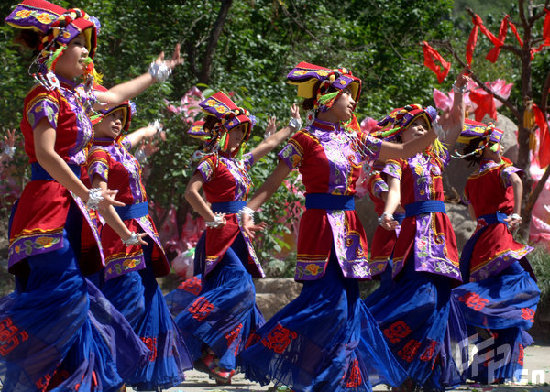Officials in Beichuan county, Sichuan province, are most concerned with restoring livelihoods.
Shengli village in Leigu town has become the country's biggest resettlement area for earthquake survivors. With plank houses occupying farms in some 30 villages, planting crops no longer offers a feasible source of income for the locals.
"Once we've are done with building houses, we should focus on tourism ," says village head Xi Shuyou.
Xi used to run businesses in water, construction and medicinal herbs. When the quake struck, he cooked the rice stored in his home for the desperate survivors.
|

|
|
Qiang is one of the oldest ethnic minorities in China with a history of more than 8,000 years. [CFP] |
When President Hu Jintao visited the village on May 16 last year, local officials chose Xi to be their spokesperson and later decided to make him their leader.
Xi says for centuries the Qiang people have neglected their traditions. "We must now seize this rare opportunity to develop our folk culture," he says .
Last September, he invited Wang Guanquan to teach locals traditional Qiang songs and dances. Xi was surprised at the enthusiastic response and noticed how the singing and dancing were providing an emotional outlet.
Xi also invited Mu Guangyuan, another Qiang expert, to make locals aware of the history, culture and customs of the Qiang people.
Mu's grandson died in the earthquake and his distraught son-in-law committed suicide last October. But 69-year-old Mu has found the strength to continue because of his work.
Mu says Qiang is one of the oldest ethnic minorities in China with a history of more than 8,000 years. He believes they are descendants of the Dangxiang Qiang people who founded the Western Xia Dynasty (1038-1227).
When Robert Zoellick, president of the World Bank, visited Beichuan last December, Mu presented him with a sheepskin vest made in the Qiang fashion.
On April 26 this year, the first post-quake group wedding in Beichuan was held at Jina Qiang village near the settlement. The brides and grooms were farmers, officials, workers and others who had lost their loved ones in the disaster.
Tang Hongmei, vice-director of Beichuan Cultural and Tourism Bureau, says it is time to move on.
"The road ahead is long, we cannot live on others' donations."
Beichuan is now focusing on developing its culture industry. Two companies have been formed to teach local women Qiang embroidery. Other crafts such as walnut carving are also being given a boost.
(China Daily May 18, 2009)